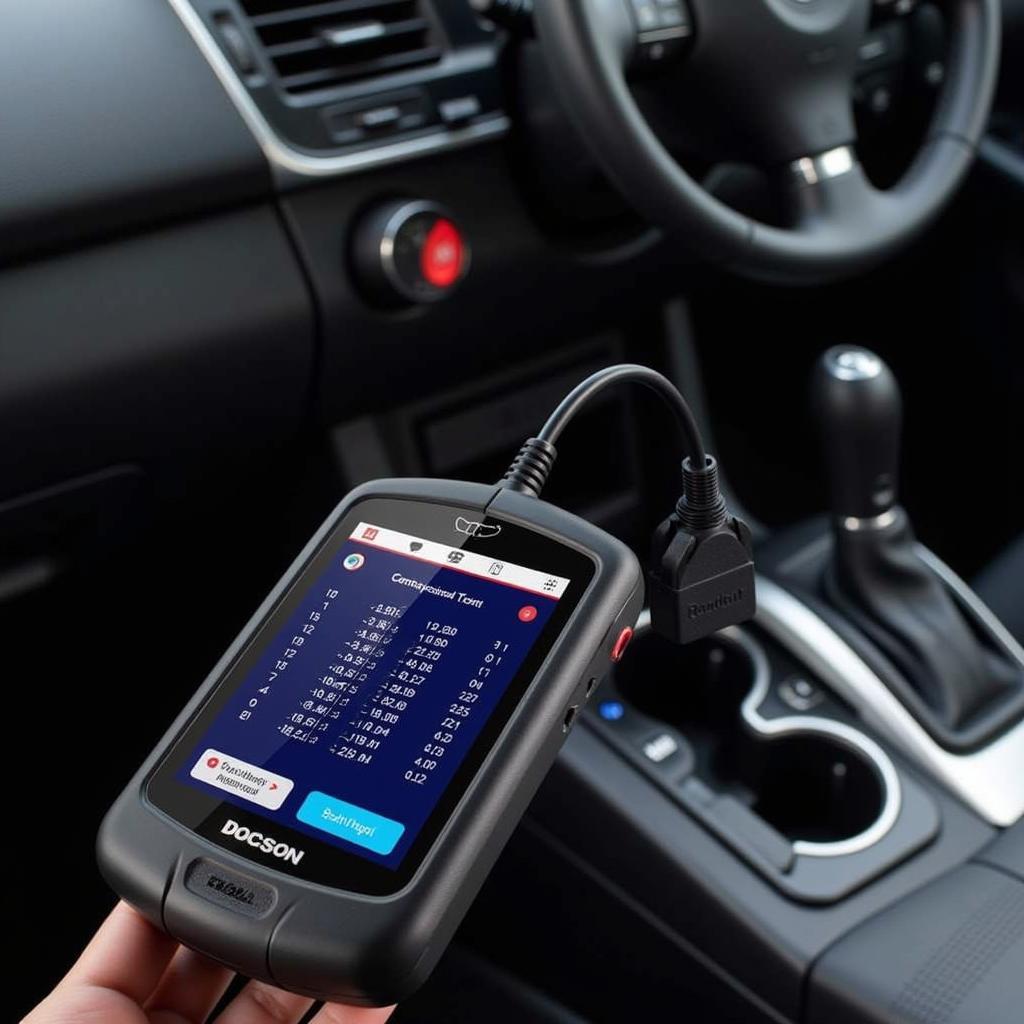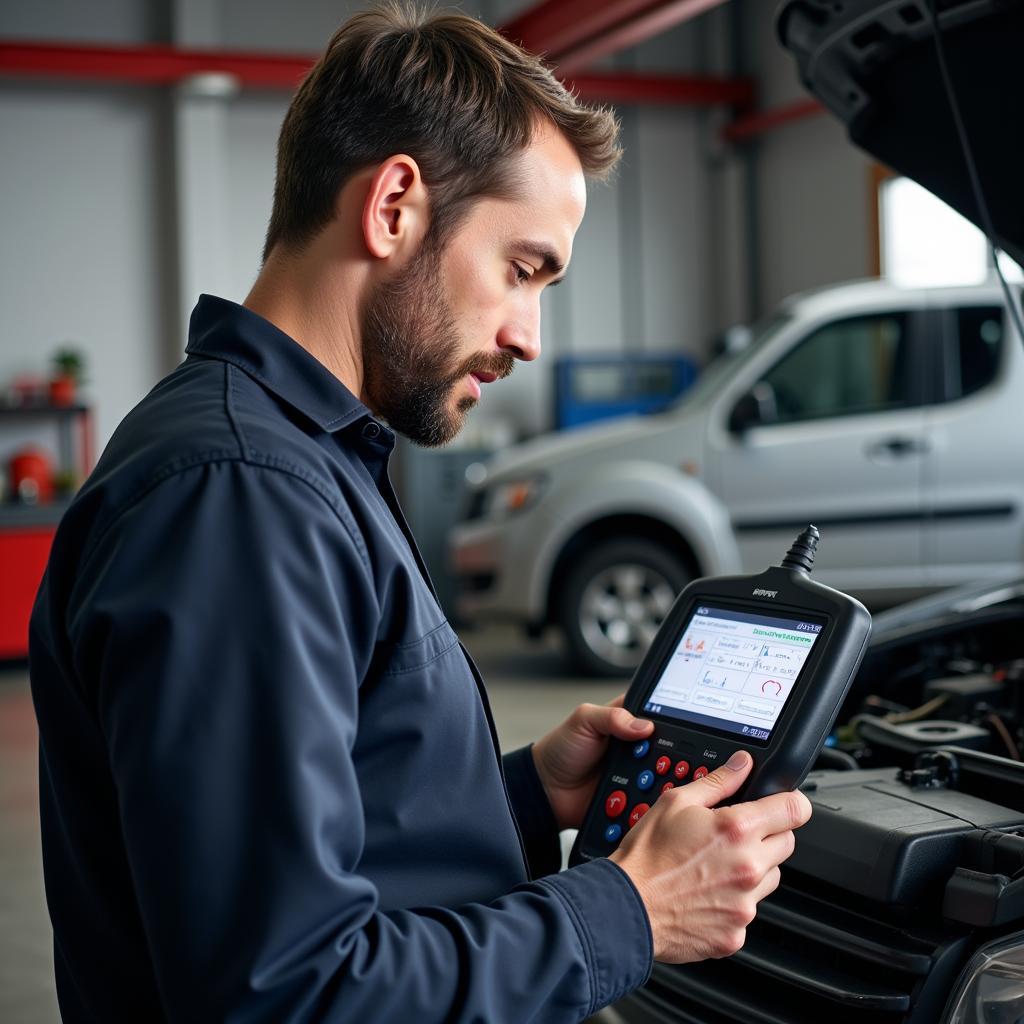Choosing the right car diagnostic tool can feel like navigating a maze, especially with the vast number of options available. Whether you’re a seasoned mechanic or a car enthusiast looking to troubleshoot your own vehicle, this comprehensive Car Diagnostic Tool Review will guide you through the essential features, leading brands, and help you make an informed decision.
Understanding Car Diagnostic Tools: What Do They Do?
Before we delve into the reviews, let’s answer a fundamental question: What does a car diagnostic tool actually do?
These tools act as a window into your car’s computer system, allowing you to:
- Retrieve Diagnostic Trouble Codes (DTCs): When your car’s “check engine” light illuminates, a DTC is stored in the vehicle’s computer. These codes pinpoint the potential source of the problem.
- Read and Clear Codes: Car diagnostic tools not only retrieve but also display the meaning behind these cryptic codes, making troubleshooting significantly easier. Once the issue is resolved, you can use the tool to clear the codes and turn off the warning light.
- View Live Data Stream: For a real-time understanding of your vehicle’s performance, these tools display live data from various sensors, including engine RPM, coolant temperature, oxygen sensor readings, and more.
 Car Diagnostic Tool Connected to a Car
Car Diagnostic Tool Connected to a Car
Types of Car Diagnostic Tools: From Basic to Professional
Car diagnostic tools cater to a wide range of users, from DIY enthusiasts to professional mechanics. Here’s a breakdown of the common types:
-
Basic Code Readers: Ideal for beginners, these affordable tools primarily read and clear DTCs.
-
OBD2 Scanners: Offering a step up from basic code readers, OBD2 scanners provide more in-depth information, including live data streaming and freeze frame data, which captures vehicle parameters at the moment a fault code was triggered.
-
Advanced Diagnostic Scanners: Used by professional mechanics, these high-end tools offer extensive functionalities like bi-directional control (allowing you to activate specific vehicle components), coding and programming capabilities, and access to manufacturer-specific data.
 Mechanic Using a Professional Diagnostic Tool in a Garage
Mechanic Using a Professional Diagnostic Tool in a Garage
Key Factors to Consider When Choosing a Car Diagnostic Tool
With a plethora of options available, selecting the right car diagnostic tool requires careful consideration of your needs and budget. Here’s what to keep in mind:
- Vehicle Compatibility: Ensure the tool supports your vehicle’s make, model, and year. Most modern cars use the OBD2 standard, but older vehicles may require specific adapters or tools.
- Features: Determine the essential features you need, whether it’s basic code reading and clearing or advanced functionalities like live data streaming and bi-directional control.
- User Friendliness: Opt for a tool with an intuitive interface, easy-to-understand menus, and clear instructions.
- Software Updates: Choose a tool that offers regular software updates to ensure compatibility with the latest vehicle models and technologies.
- Price: Car diagnostic tools range widely in price. Set a budget beforehand and explore tools within that range, considering the features and value they offer.
FIXD Car Diagnostic Tool Reviews: An In-Depth Look
FIXD has gained popularity as a user-friendly and affordable car diagnostic tool, particularly among car owners who prefer a DIY approach to troubleshooting. But how does it stack up against the competition?
Our in-depth FIXD car diagnostic tool reviews provide a comprehensive analysis of its features, pros, and cons, helping you decide if it’s the right fit for your needs.
Autophix V007 Car Diagnostics Tool: Budget-Friendly Option with Advanced Features
For those seeking a balance between affordability and functionality, the Autophix V007 presents a compelling option. Our review delves into its capabilities, including its ability to perform advanced functions like ABS bleeding and SAS calibration, making it a versatile choice for DIY enthusiasts and small workshops.
Vident OBD2 Scanner Universal Car Diagnostic Scan Tool Enhanced iEasy300: Professional-Grade Diagnostics for DIYers
The Vident iEasy300 bridges the gap between professional and DIY car diagnostic tools. Our review explores its comprehensive functionalities, including its ability to access manufacturer-specific codes, perform DPF regeneration, and offer advanced coding capabilities.
Car Diagnostic Tool Review: Finding the Right Fit
Investing in the right car diagnostic tool empowers you to take control of your vehicle’s maintenance, saving you potential headaches and costly mechanic visits in the long run. By carefully considering your needs, budget, and the factors outlined in this review, you can confidently choose a tool that fits your requirements and helps you keep your car running smoothly for years to come.
FAQs
1. Do I need a car diagnostic tool if my car doesn’t have a “check engine” light on?
While a “check engine” light is a clear indicator of a problem, a car diagnostic tool can be useful even without an active warning. It allows you to monitor various systems, identify potential issues early on, and stay informed about your vehicle’s overall health.
2. Can I use any car diagnostic tool on any car?
While most modern cars use the OBD2 standard, compatibility can vary depending on the vehicle’s make, model, and year. Always check the tool’s compatibility specifications before purchasing.
3. Are car diagnostic tools difficult to use?
Many car diagnostic tools are designed with user-friendliness in mind, offering intuitive interfaces and clear instructions. However, the complexity can vary depending on the tool’s features and capabilities.
4. Can I fix any car problem with a car diagnostic tool?
Car diagnostic tools primarily help identify problems. While they can guide you towards a solution, they don’t physically fix the issue. Some tools offer advanced functionalities that allow for certain repairs, but these are typically limited to professional-grade models.
5. What is the best car diagnostic tool for beginners?
For beginners, a basic code reader or a user-friendly OBD2 scanner with a clear interface and easy-to-understand instructions is a good starting point.
6. Are expensive car diagnostic tools always better?
Not necessarily. The best tool depends on your individual needs and budget. While more expensive tools offer advanced features, a budget-friendly option might suffice for basic diagnostics and troubleshooting.
7. Can a car diagnostic tool tell me when my next oil change is due?
Some advanced car diagnostic tools offer maintenance reminders based on mileage or time intervals. However, it’s always recommended to consult your vehicle’s owner’s manual for specific maintenance schedules.
For more in-depth reviews and comparisons of specific car diagnostic tool models, explore our dedicated review pages:
- OBD2 Scanner Universal Car Diagnostic Tool Fault Code Reader Reviews
- Argos Streetwise Car Diagnostic Tool
Need help choosing the right car diagnostic tool? Contact us via WhatsApp: +1(641)206-8880, Email: [email protected]. Our 24/7 customer support team is ready to assist you.

Leave a Reply